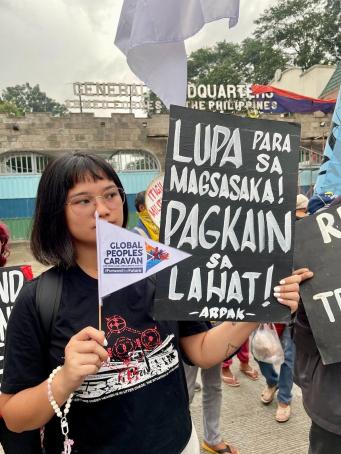Rural peoples and advocates kicked off the Global People’s Caravan (GPC) for Food, Land and Climate Justice in several countries in Asia, holding mobilizations geared up towards the UNFCCC Conference of Parties 28 (COP28) climate talks in Dubai. Caravans were held in the Philippines and Pakistan, while other actions were conducted in rural communities in India, Sri Lanka, Nepal, and Bangladesh.
The GPC, with the theme “Rural peoples unite for a future free from hunger, dispossession, and destruction,” is an awareness and organizing campaign that mobilizes rural peoples around their local and national struggles for food and land rights, while bringing to the international policy arena their demands for climate justice and genuine sustainable development. The GPC, launched in March 2023, was organized amid the worsening global food and climate crises, a continuation of the Global South-led campaign for food systems transformation.

In the Philippines, hundreds of farmers, agricultural workers and fisherfolk from the regions of Southern Tagalog, Central Luzon, Negros and Bicol fighting land and resource grabbing held their caravan from October 19 to 20 with various protests, including in front of the military headquarters to denounce the killings of farmers and bombing of rural communities. The Philippines is the most dangerous country for land and environmental defenders in the region, according to Global Witness, which recorded 177 killings worldwide in 2022..
“Genuine land reform remains the primary solution to world hunger. We as small food producers remain as society’s poorest and hungriest because local elites, big transnational corporations, and imperialist powers continuously take away our lands and plunder our natural resources, exploit our labor, control almost all aspects of food systems, violate our rights, and destroy the environment. In order for us to sustainably produce food for all, we must end feudal and imperialist exploitation in our own countries by taking back control over land and resources. To move forward towards genuine rural development, we must reverse decades of neoliberal policies and stop capitalist profiteering in food and agriculture. Only then can rural peoples be free to build just, equitable, healthy, and sustainable food systems,” said Cathy Estavillo, sceretary general of the National Federation of Peasant Women in the Philippines (AMIHAN) and vice chair for Southeast Asia of the Asian Peasant Coalition (APC), one of the GPC co-organizers.

Meanwhile, in Pakistan, hundreds of farmers in the province of Sindh joined the first in a series of caravans to be held in the country as a response to challenges related to water scarcity and other climate impacts, land grabbing, and deforestation. “Rural peoples directly bear the brunt of climate change impacts, which often translates to loss of lives and livelihoods. But instead of putting the brakes on capitalist profiteering that have destroyed our lands, plundered our natural resources, polluted and heated up the planet, governments and international institutions are giving the green light to big corporations cashing on the climate crisis through false climate solutions that will lead to more land grabbing and displacement of rural peoples,” said Tarik Mehmood, spokesperson of Pakistan Kissan Mazdoor Tehreek and APC secretary general.
Peasant movements and CSOs in several countries also mobilized on October 16 World Hunger Day as part of the Global People’s Caravan. A UN report assessing progress of the Sustainable Development Goals estimates that 29.6% of the global population – or 2.4 billion people – are moderately or severely food insecure, meaning they did not have access to adequate food. Seventy-one organizations from 21 countries supported the GPC’s World Hunger Day statement that there is “Zero Hope for Zero Hunger” unless radical reforms are undertaken.

In Bangladesh, BARCIK and SHISUK held community consultations, discussions on climate impacts on farming practices, seed sharing, traditional food fairs, agroecology training, and mobilizations among indigenous peoples, rural women, and youth in various villages. Community consultations and mobilizations–covering issues of land grabbing, seed conservation, climate impacts, and agroecology–were also held among pastoralists, indigenous peoples, farmers, and farmworkers in several villages in India, led by SDDS, Keystone Foundation, and APVVU. Caritas in Nepal led a food demonstration among rural women to promote culturally appropriate and locally available food. In Sri Lanka, women of Vikalpani led a petition signing to support the demands of rural people for food, land and climate justice.
The demands of rural peoples will be presented at the Rural Peoples Speak-Out during the COP28, with activities of the People’s Caravan continuing until the climate talks. The GPC will culminate at next year’s UN Summit of the Future as the Global South-led counter-mobilization that will amplify rural peoples vision for sustainable development, food system transformation, and just rural transition.
The People’s Caravan is organized by the People’s Coalition for Food Sovereignty, PAN Asia Pacific, APC, Int’l Indigenous Peoples Movement for Self Determination & Liberation, International League of People’s Struggles, Asia Pacific Research Network, and People’s Rising for Climate Justice. ###


